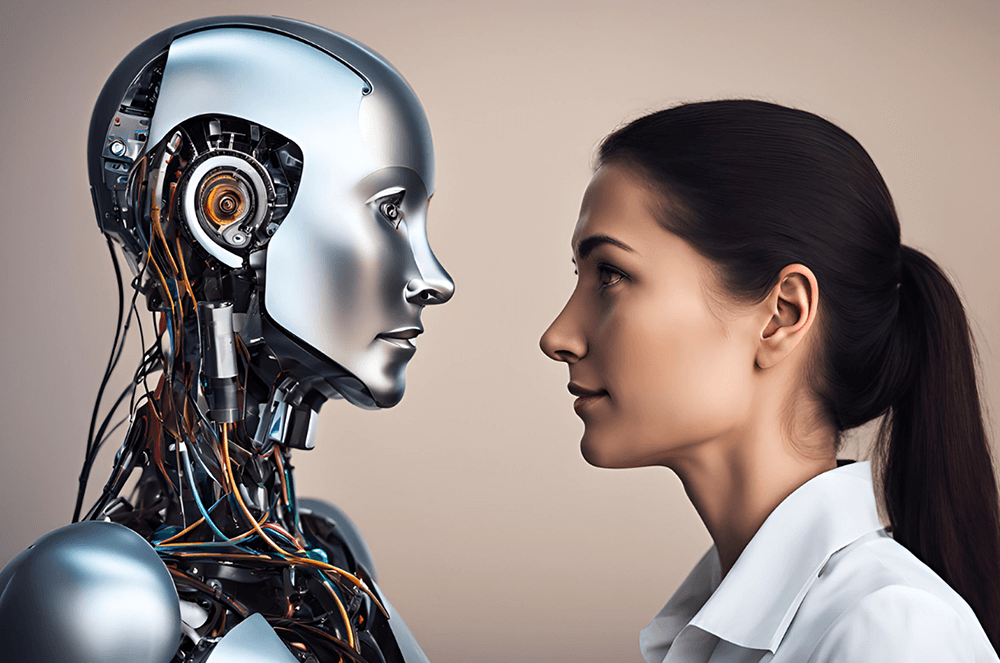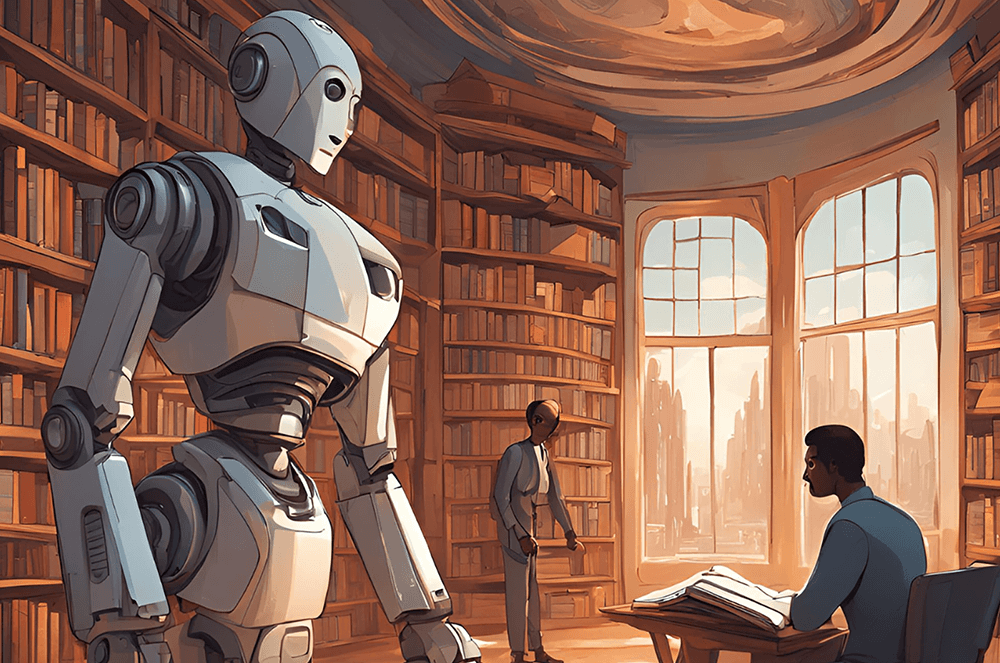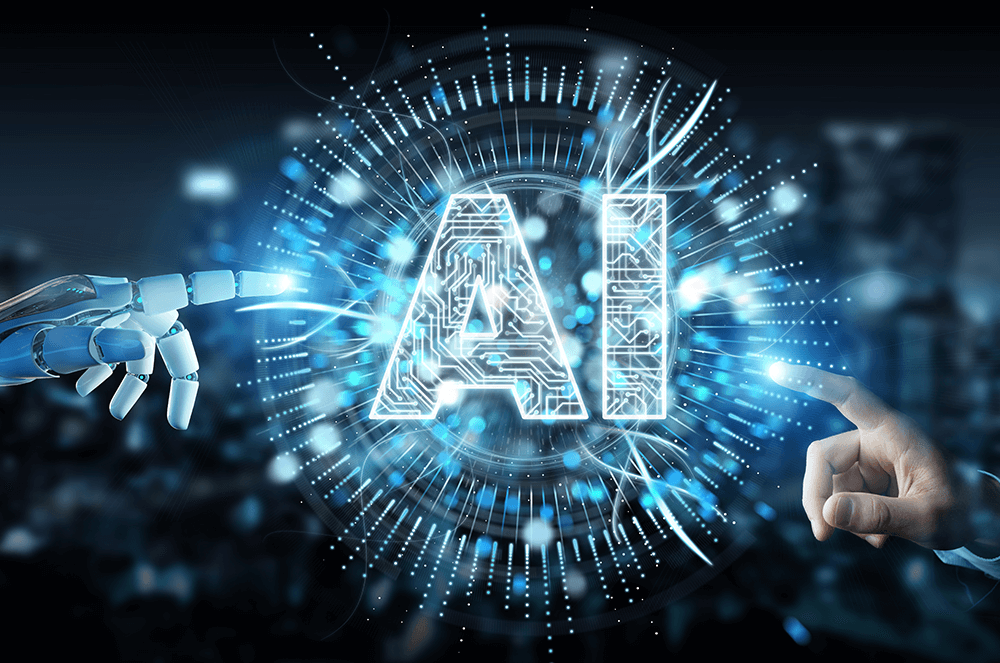
As machines have become capable of doing human work—think computers and self-driving cars—people keep pushing the next frontier of technology. Recently that frontier has been artificial intelligence, or AI.
With its rapidly developing technology, AI is now not only able to mimic human-written text, but can also sound empathetic, wise, humorous, and even flirty. Who needs a real person when we can get it all from a machine?
But we will always need real people, perhaps even more so amid the surging momentum of AI. Despite all that it can do, AI is inferior to a human’s complex problem-solving capabilities and deep array of emotions. It cannot exist without humans.
The Value of Human Values
An AI program can quickly provide an estimated best response out of thousands, perhaps millions, of examples at its disposal. And AI gets it incredibly right, almost every time.
While a person may be limited or influenced by their personal beliefs, values, experiences, and ways of dealing with situations, an AI program has no preconceived opinions. And that’s exactly the issue: Anything we care for as humans, be it a value, right, or personal experience, is only a concept, an abstraction for an AI program. It can sound empathetic and enthusiastic, but deeply felt grief, joy, love, or awe means as much to artificial intelligence as pavement, earwax, or plutonium means to you: not much more than a descriptor.
That ability to feel the meaning of a word, and on top of that, to pronounce that word, the pause, intonation, attention, and emphasis it’s been given, can only be understood by a real human.
A listener to your speech may feel touched, awed, and inspired. This skill to move an audience rather than logically arrange words by estimation and probability in the hopes it might awe is what makes humans stand out in an AI world. With an overload of computing power available for everyone, our soft skills are what make us stand out more than ever before.
Artificial intelligence programs can endlessly compare, analyze, assess, and rank human traits like communication, teamwork, leadership, and creativity. They can even write about these traits in detail. However, only humans can truly experience them. That experiential factor is our leading edge over AI, and no one can take that away.
Consider nuanced questions: Should the business expand or reorganize? Does the red or yellow dress suit you better? Is candidate A or B a better fit for the team? AI can only list pros and cons and, at most, make a logical analysis, while a person has the experience and complex thinking that AI does not have.
The “Human Line”
It’s becoming more and more apparent that search engines and social media have more information about us than we are likely comfortable with—information we’ve freely typed in, as well as what’s gleaned from algorithmic probabilities and the cookie crumbs of information we leave behind on the internet.
This has led to the coining of a new term: “the creepy line.” The phrase was uttered by Eric Schmidt, former CEO of Google, as he attempted to explain the point up to where large data platforms and IT companies felt they could reasonably go without crossing a line—that line being drawn partly out of ethical concerns, partly to save face with the public.
Anything we care for as humans, be it a value, right, or personal experience, is only a concept, an abstraction for an AI program.
Similarly, there is what I would call the “human line”: AI can synthesize all the bits of information around empathy, wisdom, human dynamics, and insight up to the point where it can reasonably estimate a human response—and no further.
Just as people fear that search engines and social media will cross over the creepy line and manipulate our opinions and buying decisions, there is a fear that AI will secretly become more intelligent than us, even gain the intelligence to outsmart us so we continue to think we are in control while in reality, AI has taken over.
I understand the scare, but even though AI can be cunningly smart, it will never be able to actually cross that human line and show genuine empathy based on feelings and personal experiences. Nor can it come up with something truly profound that’s not a re-work of existing knowledge.

Of course, developers constantly train AI to cover up its human line, and they continue to shave off the sharp edges. For instance, you may have noticed that ChatGPT responds in a chattier and more apologetic manner than a person would. Most likely, this is a cover-up of its human line, or perhaps even this will improve over time. However, while the human boundary is not solid, it will always remain a line.
No one can feel and think like you, express and create like you, and therefore speak and engage like you. I’ve tried having ChatGPT write my Toastmasters speech, and even after a few iterations, the result is mediocre at best, a bit robotic, and quite generic. Even though AI can analyze endless examples and estimate what an audience likes to hear, I don’t anticipate that a great, motivating speech could ever be written by it.
The best way to utilize the endless computing power of AI is to shake up your own thinking. AI can act as a sounding board for ideas. You can turn to it for help when you are stuck on finding the right angle to your point, or if you need help brainstorming ideas for another point in your speech.
Wondering about a way to say things differently? Ask AI to come up with 10 variations.
Curious if there is a speech in a life experience on your mind? Ask AI if it can come up with a few structures.
Not all of AI’s suggestions are brilliant, but they can tickle your imagination and help you string a useful new approach together. Then it is your turn to shine making these content ideas into something that comes from you.
Recently, AI was able to help me come up with a new angle for my Toastmasters speech, navigate a difficult situation at work, and tactically negotiate rental agreements with my landlord. In all three situations, AI helped me to refresh my viewpoint. Even though it doesn’t have human feelings, it can mechanically indicate where you are stuck, and how you can improve from there.
AI can beat a human on computing power, but its responses will always sound calculated. AI can come up with an almost never-ending list of solutions, but only a human can pick the right one. And while AI can estimate how you feel, only a human can connect to the feeling.
As a sounding board, AI can help improve your communication skills at work and at Toastmasters, but only you can lift those nudges into true creativity and surpass the human line by being you.
AUTHOR'S NOTE: This article was written without the aid of AI (but the images were made with AI).
Victor David is Immediate Past President of the City Tattersalls Toastmasters Club in Sydney, Australia, where he works for the government as a senior communications advisor. He is founder of aixplainer.com, a platform that helps people to understand AI better. Contact him at victor@aixplainer.com.



 Previous
Previous

 Previous Article
Previous Article

